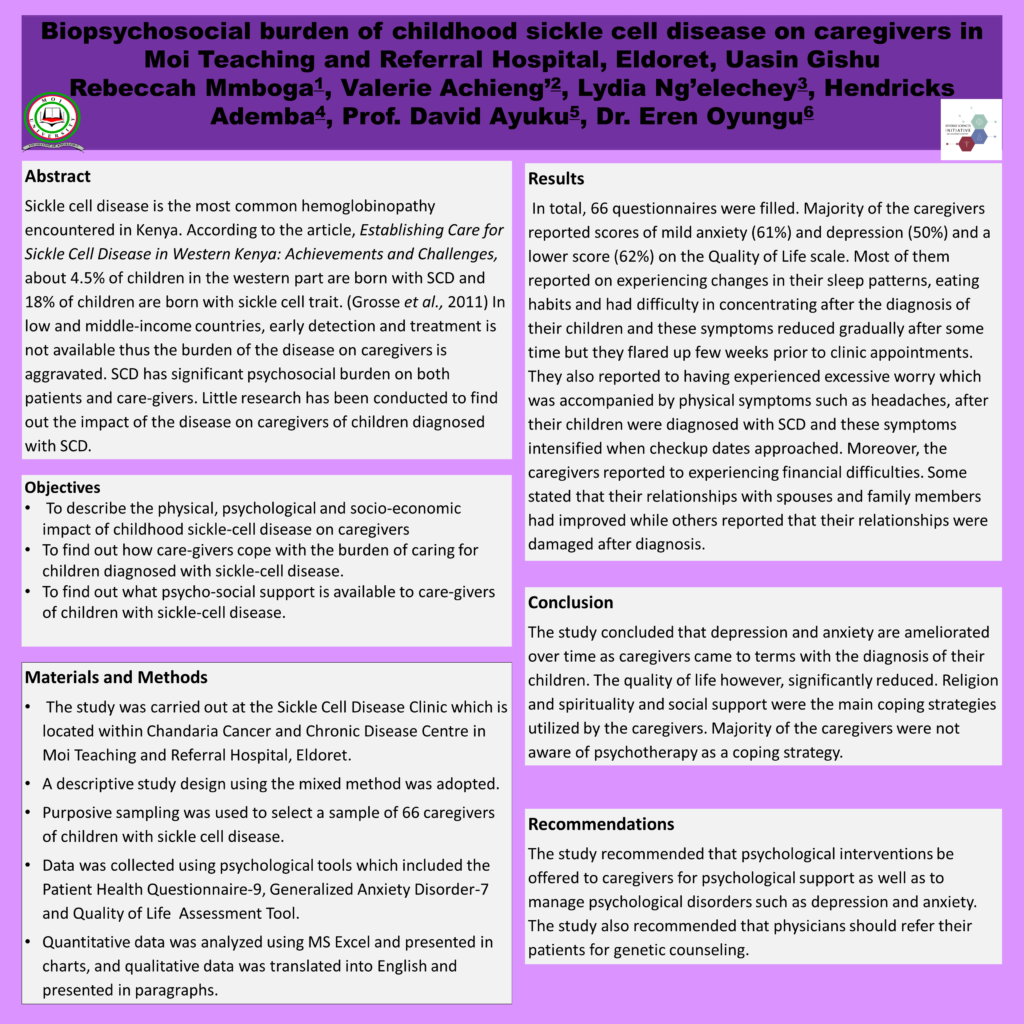Rebeccah Mmboga Amulioto
Conference 2023 Presentation
Project title
Biopsychosocial Burden of Childhood Sickle Cell disease on caregivers in Moi Teaching and Referral Hospital, Eldoret, Kenya
Authors and Affiliations
Rebeccah Mmboga1, Valerie Achieng’1, Lydia Ng’elechey1, Hendricks Ademba1, Prof. David Ayuku2, Dr. Eren Oyungu3
1.School of Medicine, Moi University, Eldoret, Kenya
2.Department of Mental Health and Behavioral Sciences, Moi University, Eldoret, Kenya
3.Department of Medical Physiology, Moi University, Eldoret, Kenya
Abstract
Background
Sickle cell disease is the most common hemoglobinopathy encountered in Kenya. According to the article, Establishing Care for Sickle Cell Disease in Western Kenya: Achievements and Challenges, about 4.5% of children in the western part are born with SCD and 18% of children are born with sickle cell trait. Globally, over 300,000 children are born with SCD each year, and approximately 70% of these are in Africa where very little research has been conducted (Grosse et al., 2011, Modell &Darlison, 2008). In low and middle-income countries, early detection and treatment is not available thus the burden of the disease on caregivers is aggravated. In a 2013 study, it was estimated that 50-90% of infants born with SCD in Africa died before age 5 (McGann et al., 2013). SCD has significant psychosocial burden on both patients and care-givers. Little research has been conducted to find out the impact of the disease on caregivers of children diagnosed with SCD.
Methods
The study was carried out at the Sickle Cell Disease Clinic which is located within Chandaria Cancer and Chronic Disease Centre in Moi Teaching and Referral Hospital, Eldoret. A descriptive study design using the mixed method was adopted. Purposive sampling was used to select a sample of 66 caregivers of children with sickle cell disease. Data was collected using psychological tools which included the PHQ-9, GAD-7 and QoL Assessment Tool. Quantitative data was analyzed using MS Excel and presented in charts, and qualitative data was translated into English and presented in paragraphs.
Results
A total of 66 questionnaires were filled. Majority of the caregivers reported scores of mild anxiety (61%) and depression (50%) and a lower score (62%) on the Quality of Life scale. Most of them reported on experiencing changes in their sleep patterns, eating habits and had difficulty in concentrating after the diagnosis of their children and these symptoms reduced gradually after some time but they flared up few weeks prior to clinic appointments. They also reported to having experienced excessive worry which was accompanied by physical symptoms such as headaches, after their children were diagnosed with SCD and these symptoms intensified when checkup dates approached. Moreover, the caregivers reported to experiencing financial difficulties. Some stated that their relationships with spouses and family members had improved while others reported that their relationships were damaged after diagnosis.
Conclusions
Depression and anxiety were ameliorated over time as caregivers came to terms with the diagnosis of their children. The quality of life however, significantly reduced. Religion and spirituality and social support were the main coping strategies utilized by the caregivers. Majority of the caregivers were not aware of psychotherapy as a coping strategy.

